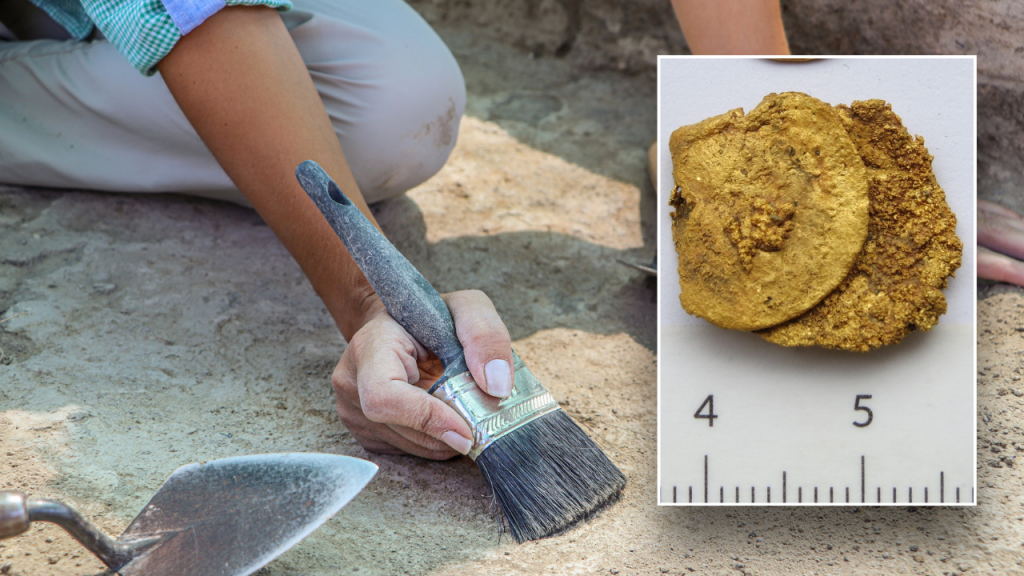Archaeologists recently unearthed five Byzantine gold coins dating back to the reign of Justinian the Great in the northern Bulgarian village of Debnevo. The unexpected discovery was made during an excavation led by Dr. Stiliyan Ivanov, an associate professor at the National Institute of Archaeology and Museum. The coins, found in the remains of a 10th-century house close to a fifth-century fortress, puzzled researchers as they predated the structure by over 400 years. Ivanov believes that medieval builders likely stumbled upon the coins while constructing the house, which later burned down in the same century.
Despite the house’s destruction, three of the coins remain in excellent condition while two are fused together, likely due to the fire that ravaged the dwelling. The front of the coins prominently features Justinian’s face along with the inscription “Our Lord Justinian Perpetual Augustus,” while the reverse side bears the phrase “Victory of the Augusts.” The medieval residents who inhabited the house likely considered the coins valuable and saved them as heirlooms. The unexpected find has captured the interest of experts and the public alike, shedding light on the village’s rich history and fascinating archaeological discoveries.
In addition to the gold coins, the excavation also yielded other artifacts such as axes, sickles, ceramic vessels, and bronze rings. While these items are of archaeological significance, the coins stand out as the most remarkable find of the project. The discovery adds to a string of recent findings of ancient coins in various locations, including ancient Greek gold coins in Turkey and a collection of silver coins minted in the Czech Republic. These discoveries highlight the ongoing importance of archaeological excavations in uncovering the past and shedding light on the history of different civilizations.
The ancient coins found in Debnevo offer a glimpse into the reign of Justinian the Great and the Byzantine Empire. Justinian, who ruled from 527 to 565 A.D., left a significant mark on history through his military campaigns, legal reforms, and architectural achievements. The coins, with their intricate designs and inscriptions, provide valuable insights into the economic and cultural activities of the Byzantine world during this period. The discovery also underscores the importance of preserving and studying such artifacts to deepen our understanding of ancient civilizations and their contributions to the modern world.
The unexpected location of the coins within the remains of a 10th-century house raises intriguing questions about the inhabitants of Debnevo and their connections to earlier periods. The village’s proximity to a fifth-century fortress suggests a long history of human habitation in the area, with each generation leaving behind traces of their lives and activities. The discovery of the coins in a structure that predates them by centuries highlights the complex layers of history and the interconnectedness of different time periods within the same geographical location.
The excitement and interest generated by the discovery of the ancient gold coins in Debnevo underscore the timeless allure of archaeology and its power to reveal hidden treasures from the past. The meticulous work of archaeologists in uncovering and interpreting these artifacts plays a crucial role in piecing together the puzzle of human history and illuminating the stories of ancient civilizations. As further excavations and research deepen our knowledge of the past, discoveries like the Byzantine gold coins in Bulgaria serve as reminders of the enduring fascination and importance of exploring our shared heritage through the lens of archaeology.


